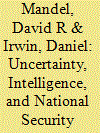|
|
|
Sort Order |
|
|
|
Items / Page
|
|
|
|
|
|
|
| Srl | Item |
| 1 |
ID:
179155


|
|
|
|
|
| Summary/Abstract |
Intelligence is seen as an inherently sovereign matter. States are ready to share intelligence but on their own terms and only with friends or allies. This is the case for the North Atlantic Treaty Organization (NATO) and the European Union (EU). Intelligence at the United Nations (UN) poses a twofold problem, both from the states’ and the organization’s perspectives. The worldwide composition of states with different political natures and domestic interests has long been identified as the main reason why states would not want to implement an intelligence structure at the UN. States do not wish to share secrets with all the countries in the world and refuse to allow other states to send troops to spy on their own governance. Moreover, the UN has long been associated with the concepts of neutrality and impartiality, which are perceived as antithetical to the activities of an intelligence bureau within the organization.
|
|
|
|
|
|
|
|
|
|
|
|
|
|
|
|
| 2 |
ID:
179153


|
|
|
|
|
| Summary/Abstract |
For centuries, the roles of diplomat and spy were closely linked. Ambassadors gathered information in many ways. Some were overt, others clandestine. The diplomats of 15th-century Venice and Russia, for example, are renowned as being especially effective intelligence collectors.1 Over time, however, the professions of diplomacy and espionage diverged, and intelligence officers and diplomats understood the distinctions even when they interacted closely. Yet, even with foreign ministries firmly established in essentially all states, meaning professional diplomats are readily available, national political leaders recurrently choose to use intelligence officers for diplomatic purposes.
|
|
|
|
|
|
|
|
|
|
|
|
|
|
|
|
| 3 |
ID:
179156


|
|
|
|
|
| Summary/Abstract |
The modern U.S. foreign intelligence apparatus is not sui generis. It is, instead, the product of evolution both in the United States’ perceptions about its role in the world and in the bureaucratic architecture that Washington has established to contend with global developments that impact the homeland. Although the accepted narrative of the Central Intelligence Agency’s (CIA)’s origin focuses on the Office of Strategic Services (OSS), and that organization’s operations abroad, there is another contributor—the Federal Bureau of Investigation (FBI)—to the formation of the United States’ foreign intelligence apparatus.
|
|
|
|
|
|
|
|
|
|
|
|
|
|
|
|
| 4 |
ID:
179152


|
|
|
|
|
| Summary/Abstract |
In memory of my friend and colleague and to honor the nearly twenty years that we worked together at the Oxford Intelligence Group (OIG), I should like to begin the process of evaluating Michael Herman’s contribution to Intelligence Studies by asking his favorite question, the one that resonates through his own work: “What difference did it make?”
|
|
|
|
|
|
|
|
|
|
|
|
|
|
|
|
| 5 |
ID:
179158


|
|
|
|
|
| Summary/Abstract |
Over the last few decades, intelligence studies moved from a unique theory based on secrecy to multiple epistemologies to address different objects (e.g., intelligence analysis, counterintelligence, foreign intelligence, military intelligence).1 For example, the organizational and functional fields highlight normative principles, such as efficiency, professionalization, and cooperation among intelligence organizations, international arenas, and private actors. As Peter Gill and Mark Phythian observe, few organizations change themselves easily and, if reform or regression takes place, it is very likely to be the result of external pressure from other, government or civil society, actors. These changes and pressures are the subjects of the governance and policy subfield in which the key question is related to the intelligence impact on government and vice versa. However, this subfield can be extended to a dmutual impact between government—mediated by intelligence agencies—and society, especially in countries of political transition and democratic consolidation.
|
|
|
|
|
|
|
|
|
|
|
|
|
|
|
|
| 6 |
ID:
179154


|
|
|
|
|
| Summary/Abstract |
In a blog post in June 2016, the threat intelligence company CrowdStrike attributed the breach of the Democratic National Committee’s (DNC’s) networks to two groups of cyber actors closely linked to the Russian government.1 The DNC had requested CrowdStrike’s assistance and gave it permission to share the results of their attribution finding with the public. CrowdStrike explained that part of what motivated the publication of their finding was to “help protect even those who do not happen to be our customers.
|
|
|
|
|
|
|
|
|
|
|
|
|
|
|
|
| 7 |
ID:
179157


|
|
|
|
|
| Summary/Abstract |
Intelligence analysis and national security decisionmaking are pervaded by uncertainty. The most consequential decisions that leaders make, such as whether to go to war, are mired in uncertainties not only reflecting what is unknown but also what is unknowable, such as the intentions of others who may not have made up their own minds.1 Those uncertainties not only make decisions about how to resolve international conflicts more difficult, they change the odds of going to war. Powerful countries seldom wage war to conquer weaker ones but rather to prevent them from developing breakout technologies that could threaten them in the long run.2 Such decisions are inevitably made under uncertainty, and the deeper and more vexing the uncertainties are, the more likely war is to follow as a conflict resolution strategy.
|
|
|
|
|
|
|
|
|
|
|
|
|
|
|
|
|
|
|
|
|